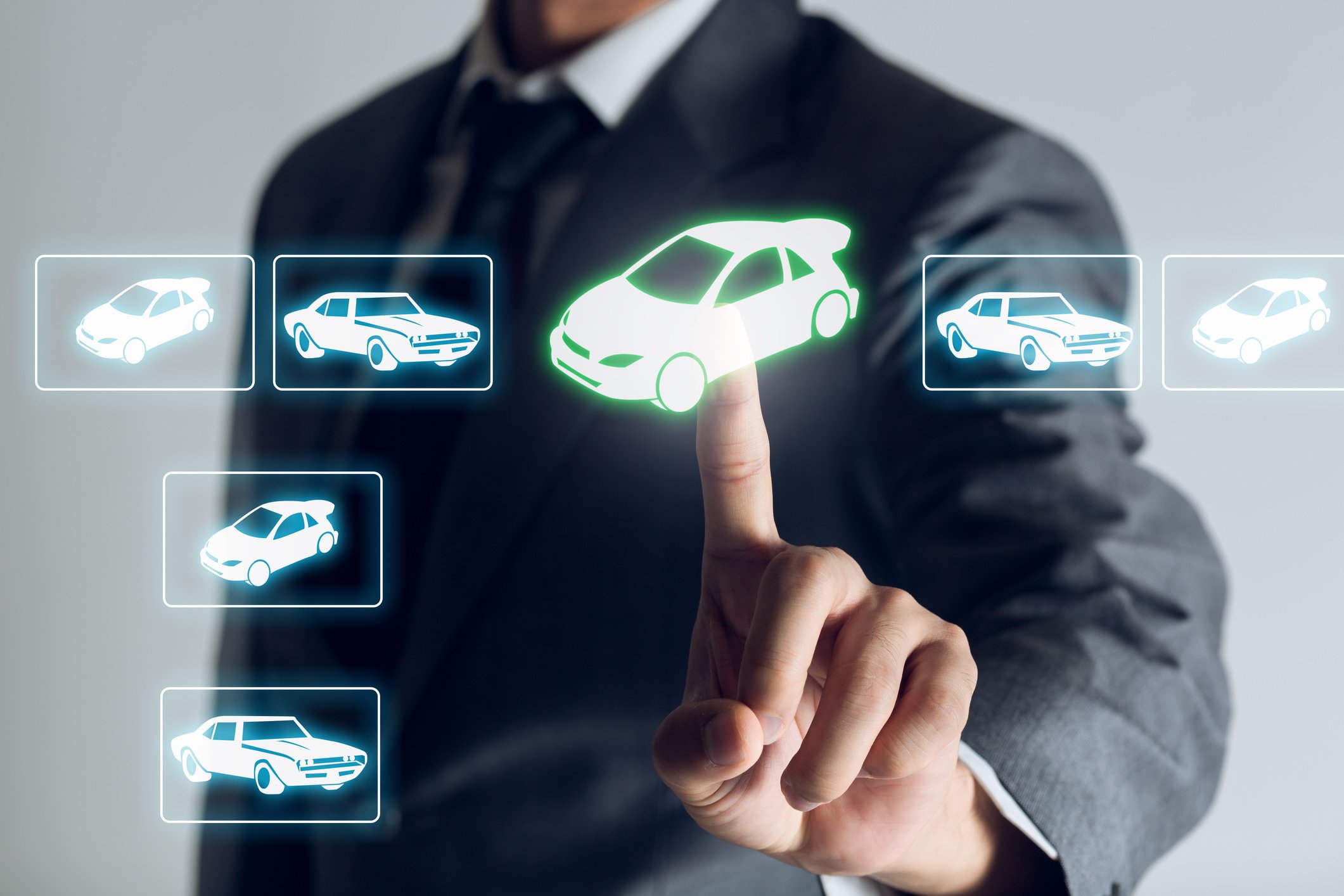- Blog
- How to Import a Car to the Netherlands
How to Import a Car to the Netherlands?
Learn how to import cars from the EU to the Netherlands as a car trader. Discover regulations, required documents, taxes, and a step-by-step process for successful imports.
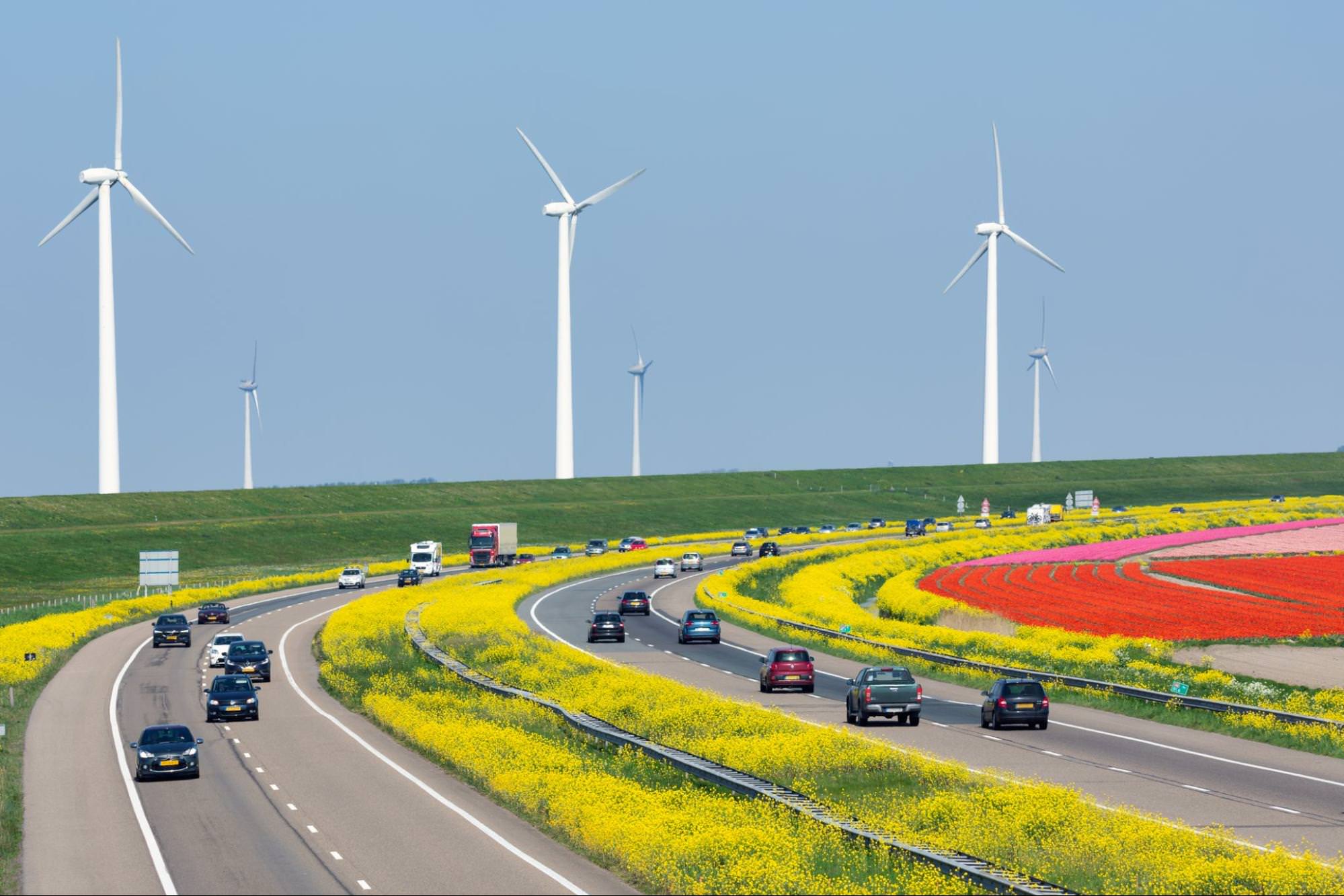
Are you a car trader looking to expand your business by importing vehicles from the EU to the Netherlands? You've come to the right place. This guide will walk you through everything you need to know about importing cars from other EU countries to the Netherlands.
We'll cover the essentials: understanding the local used car market, import regulations, necessary documentation, taxes, and a step-by-step process to ensure your imports are successful.
We'll break down each part of the process, making it easier for you to navigate the complexities of cross-border vehicle trade. Let's start by taking a closer look at the Dutch used car market to help you make informed decisions about your imports.
Get to know the Dutch used car market
Understanding the Dutch used car market is crucial for success in importing vehicles. Let's dive into some key statistics and trends that will help shape your import strategy.
In 2023, the used car market in the Netherlands saw significant growth. According to recent data, about 2 million used cars were sold, representing a 3.5% increase from the previous year. This growth indicates a strong demand for pre-owned vehicles among Dutch consumers.
The Netherlands' used car market is currently estimated at €37.74 billion and is projected to grow to over €45.78 billion by the end of 2029.
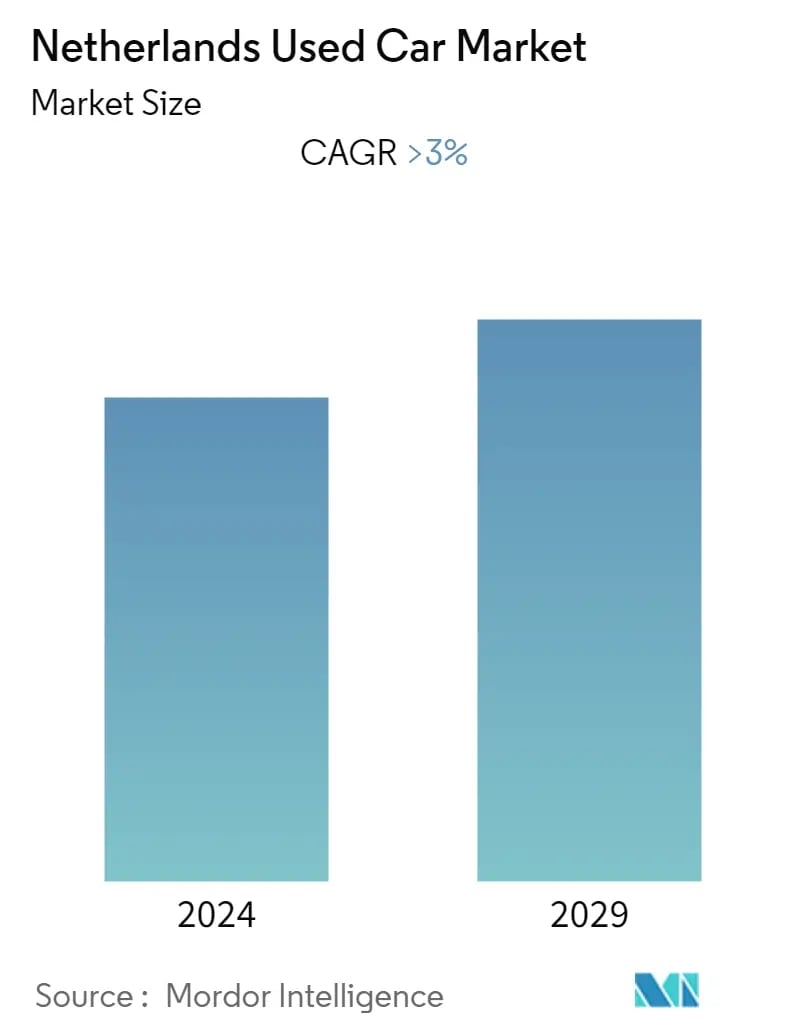
Projected growth of the Dutch used car market from €37 to €45 billion
Electric and hybrid vehicles are gaining popularity in the Netherlands. In fact, electric car sales increased by 22% in 2023 compared to 2022. This trend is greatly driven by government incentives.
The Netherlands is one of the few countries that has subsidies for used electric vehicles. In April 2023, a €600 million subsidy program for used electric vehicles was introduced to boost demand.
This is a big deal for car traders, as importing electric vehicles might be more interesting venture for car traders in the Netherlands than in other countries.
The best-selling used car of 2023 in the Netherlands was the trusty Volkswagen Polo. We should also take a look at the sales on the new car market, as those vehicles will eventually trickle down to the used car market too. In 2023, the best-selling new cars were the Tesla Model Y and Kia Picanto.
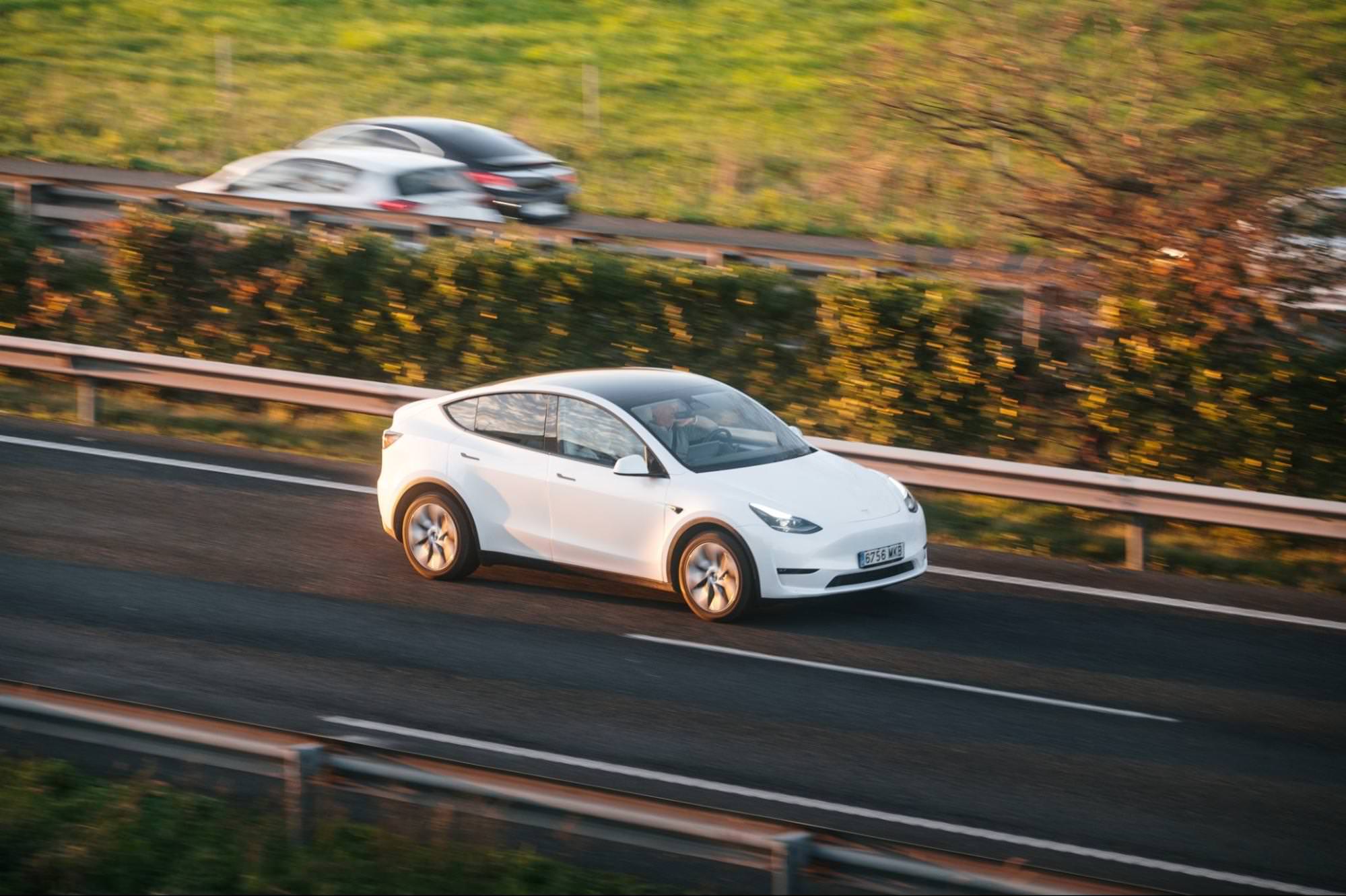
Tesla Model Y
There's also a growing interest in Asian brands like Toyota and Hyundai, particularly for their hybrid models.
It's worth noting that the Netherlands has one of the highest car densities in Europe, with about 8.9 million passenger cars for a population of 17.7 million. This high density creates a dynamic and competitive market for used cars.
Import regulations of the Netherlands
When importing cars to the Netherlands, it's crucial to comply with the country's import regulations. These rules ensure that vehicles meet Dutch and EU standards for safety, emissions, and roadworthiness.
Firstly, any vehicle you import must comply with European Type Approval standards. This means the car should have been originally manufactured for the European market or modified to meet EU specifications.
The Netherlands Environmental Assessment Agency (PBL) sets strict emission standards. As of 2024, the focus is on reducing CO2 emissions. Cars with lower emissions are generally easier and cheaper to import due to lower tax rates.
For used cars, there's an age limit to consider. Vehicles older than 30 years are classified as vintage cars and may be subject to different import procedures and tax rates.
The Netherlands also has specific rules about vehicle lighting. All cars must have daytime running lights, and headlights must be adjustable for right-hand traffic.
Regularly checking the website of the Netherlands Vehicle Authority (RDW) can help you stay up-to-date with the latest regulations.
Documentation for importing vehicles to the Netherlands
When importing cars to the Netherlands as a business, having all the necessary paperwork in order will help streamline the entire process.
Vehicle purchase invoice
This document proves your ownership of the vehicle and shows its purchase price. Ensure the invoice is original and clearly states whether the VAT has been paid in the country of origin or not.
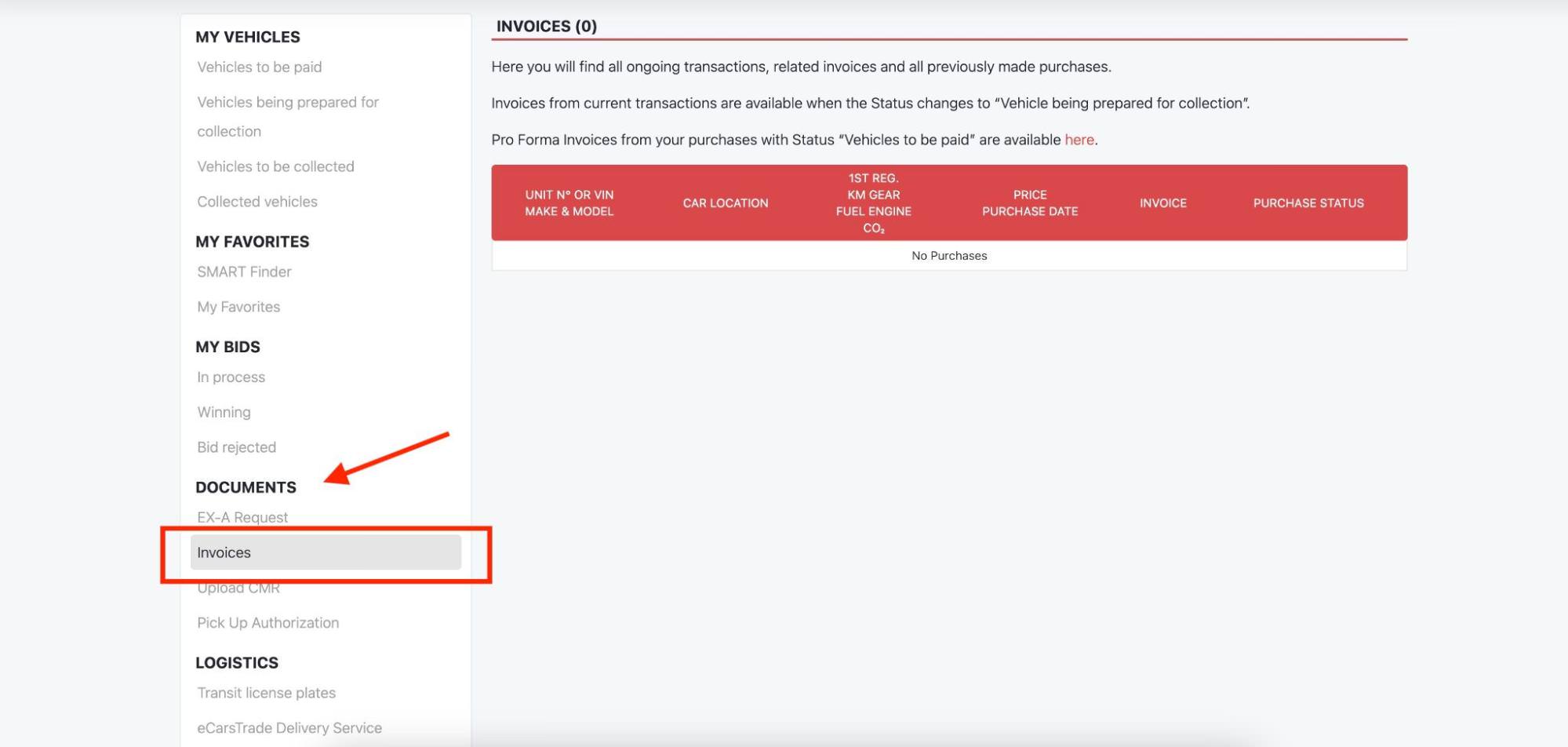
As an eCarsTrade client, you can find all your invoices on your Personal page.
Certificate of Conformity (CoC)
The Certificate of Conformity is a crucial document that proves the vehicle meets EU standards.
If the original CoC is unavailable, you may need to obtain a replacement from the manufacturer or through an online service like COC-Online, Euro Conformity, or EuroCOC.
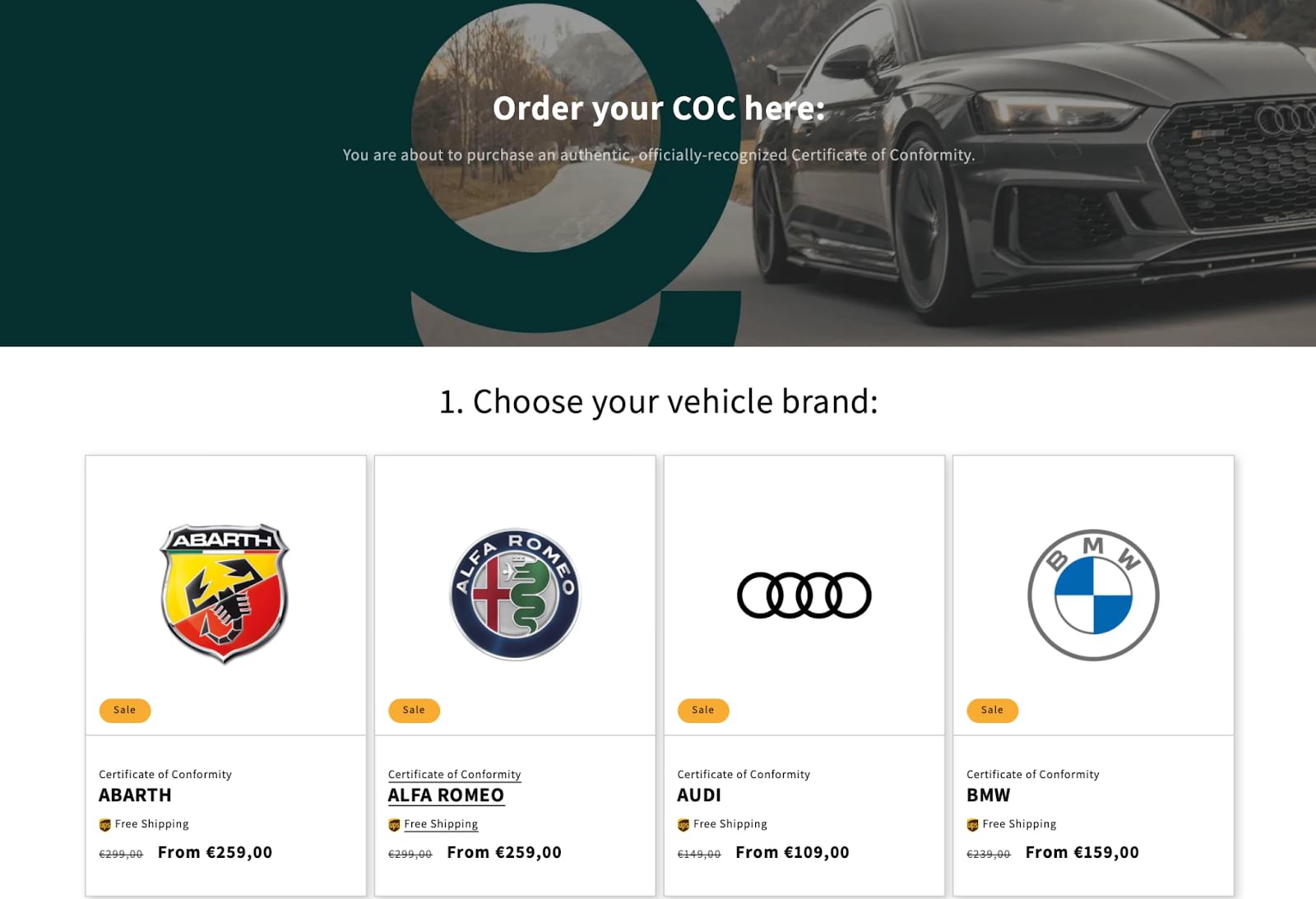
Registration documents
This is the vehicle's current registration document from its country of origin. It should show vehicle details, the previous owner's information, and the registration number.
Customs declaration form
You'll need to fill out a customs declaration form (typically an EU form) detailing:
- Vehicle information
- Your business details
- Import purpose
- Value of the vehicle
Proof of insurance
Before you can register the imported vehicle in the Netherlands, you'll need to show proof of valid Dutch insurance coverage.
BPM declaration
The BPM (Belasting van Personenauto's en Motorrijwielen) is a tax specific to the Netherlands. You'll need to fill out a BPM declaration form, which calculates the amount of tax due based on the vehicle's CO2 emissions and value.
Learn more about how BPM impacts your car business while importing used cars into the Netherlands.
VAT documentation
If you're importing from within the EU, you'll need documents proving VAT was paid in the country of origin. For imports from outside the EU, you'll need to show VAT payment at the Dutch border.
As a dealer in the Netherlands, you typically don't need to pay VAT if it was already paid in the country where the vehicle was purchased.
However, for imports from outside the EU or if the vehicle was bought without VAT, you'll need to declare and pay it in the Netherlands. Most vehicles on eCarsTrade are sold without VAT.
Environmental certificate
For some vehicles, particularly older models, you may need to provide an environmental certificate showing the car meets current Dutch emission standards.
❗Remember, always check with the RDW (Netherlands Vehicle Authority) or a customs broker for the most up-to-date requirements and documentation!
Taxes when importing a car to the Netherlands
Understanding taxes for car import to the Netherlands is crucial for car traders to accurately price their vehicles and maintain profitability.
Value Added Tax (VAT)
When importing from within the EU, you generally don't pay VAT if you're registered for VAT in the Netherlands and the seller has charged VAT in their country. However, you must report this as an intra-community acquisition.
For imports from outside the EU or if VAT wasn’t charged with the car, you'll pay 21% VAT on the vehicle's value, including shipping and insurance costs. This is paid at the point of entry.
BPM tax
BPM is a one-time tax paid when a car is first registered in the Netherlands. It's based on the vehicle's CO2 emissions and value. For used cars, the tax is calculated on the current market value and depreciation.
BPM rates change annually, so it's important to use the most current BPM calculator. In general, cars with lower emissions pay less BPM.
Import duties
These only apply to cars imported from outside the EU. The standard rate is 10% of the vehicle's value.
Registration fee
There's a small fee for registering the imported vehicle with the RDW. As of 2024, this is typically around €50, but always check for the most current rate.
❗Always check with the RDW (Netherlands Vehicle Authority) or a customs broker for accurate tax calculations. Many car traders also work with tax specialists to ensure they're calculating and paying the correct amounts.
These taxes significantly impact the final cost of importing a vehicle. Factor them into your pricing strategy to maintain your profit margins while staying competitive in the Dutch market.
Step-by-step process - From purchasing a car to importing it to the Netherlands
1. Research and purchase a vehicle
Start by immersing yourself in the Dutch used car market. Spend time analyzing popular models, price ranges, and consumer preferences. Online platforms like AutoScout24 or Marktplaats can provide valuable insights into demand and pricing trends.
We have 15,000+ vehicles available weekly on eCarsTrade, giving you plenty of choice to find the right vehicle configurations for your automotive business.
2. Obtain necessary documents
Gather all the right documentation already at this stage of the process. You'll need an original vehicle purchase invoice that includes the original registration papers and the Certificate of Conformity (CoC).
If the Certificate of Conformity does not come with the car, you will need to contact the brand of the vehicle or obtain it through an online CoC service.
Double-check with local authorities if all these documents need to be translated into Dutch by a certified translator.
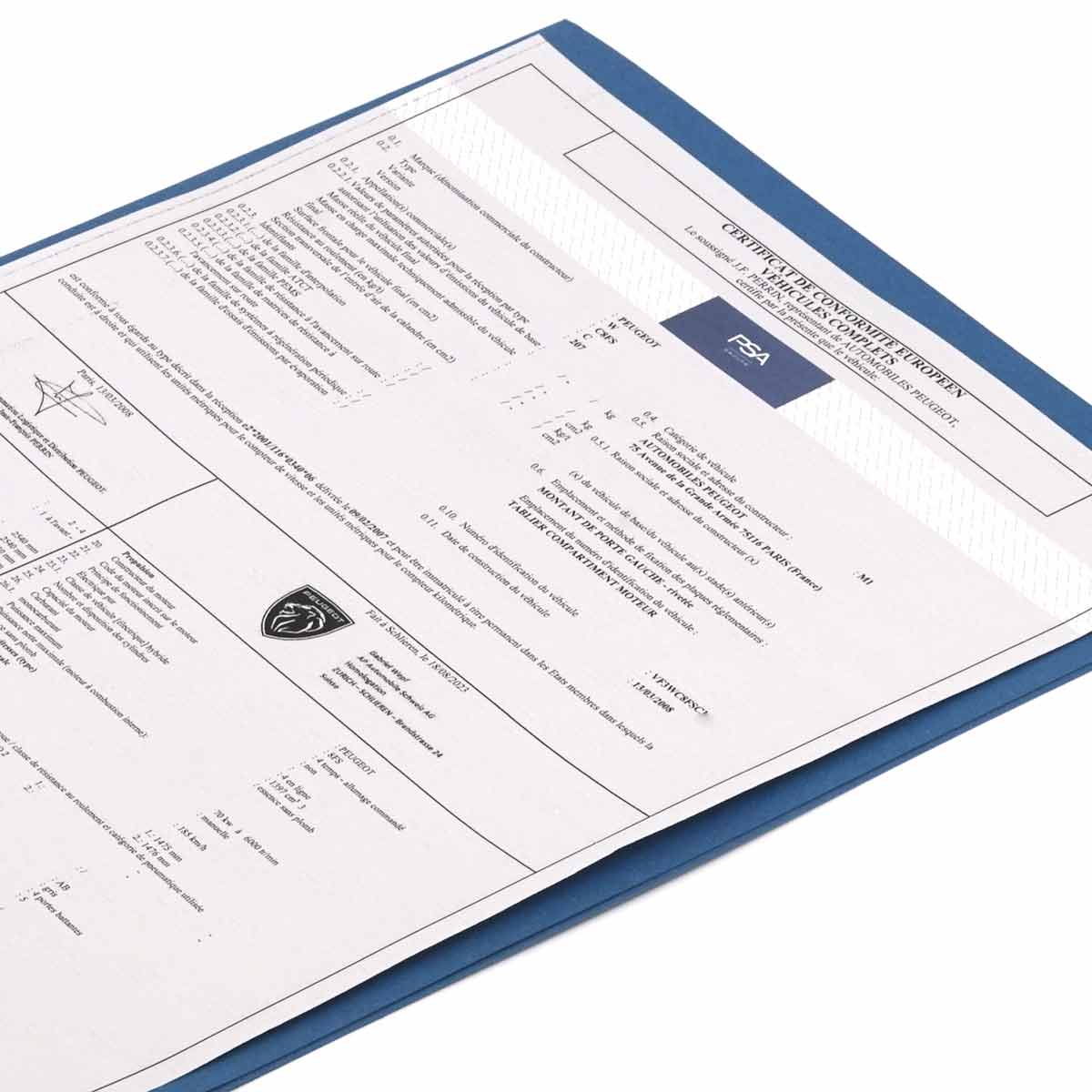
Example of a CoC
3. Arrange transportation
The next step is arranging transportation for the vehicle. The simplest option for moving cars between dealerships is to hire a car transport service.
Alternatively, you can use the eCarsTrade Delivery Service, and we’ll handle the transportation of your vehicles within the European Union. As long as your location is accessible by transport truck, we'll take care of everything!
4. Submit a Customs declaration
If you're importing from a European Union (EU) country, there’s no need to file an import declaration since goods can move freely within the EU. This means you won’t have to pay import duties or report your vehicle to Customs.
However, if you're importing a car from a non-EU country, you must submit an import declaration and pay 21% of VAT on the cumulative import value of the car (which includes expenses such as transport).
If you're new to the process or dealing with a complex case, consider using a customs broker.
5. Make a technical inspection appointment
The next step is to pass the Dutch technical inspection - RDW inspection - at your closest authorized RDW facility.
You can make an appointment online to book your time slot for the technical control.
If you’ll be driving the car to the appoinment, you can at the same time apply for a one-day registration license plate, which allows you to drive the car from your dealership to the RDW facility and back.
Take all your car documents with you to the appointment:
- Identification document
- Original registration papers
- Certificate of Conformity
- Customs declaration, if you have one
- Existing technical inspection documents, if the car has them
6. File a BPM return
Use the official RDW BPM calculator available on their website to calculate the BPM (Belasting van Personenauto's en Motorrijwielen).
You'll need the vehicle's CO2 emissions, current market value, and first registration date.
Car traders/businesses have to file a BPM return on paper. Fill out the form and send it to the designated address.
7. Vehicle registration
After the approval of your BPM return by the Belastingdienst, the RDW will send you your registration certificate within 5 working days.
The following business day, you'll receive a letter with a 9-digit registration code, which is tied to your vehicle's registration card. This card is especially important for car traders because you will need it If you want to sell, trade, scrap, or export your vehicle.
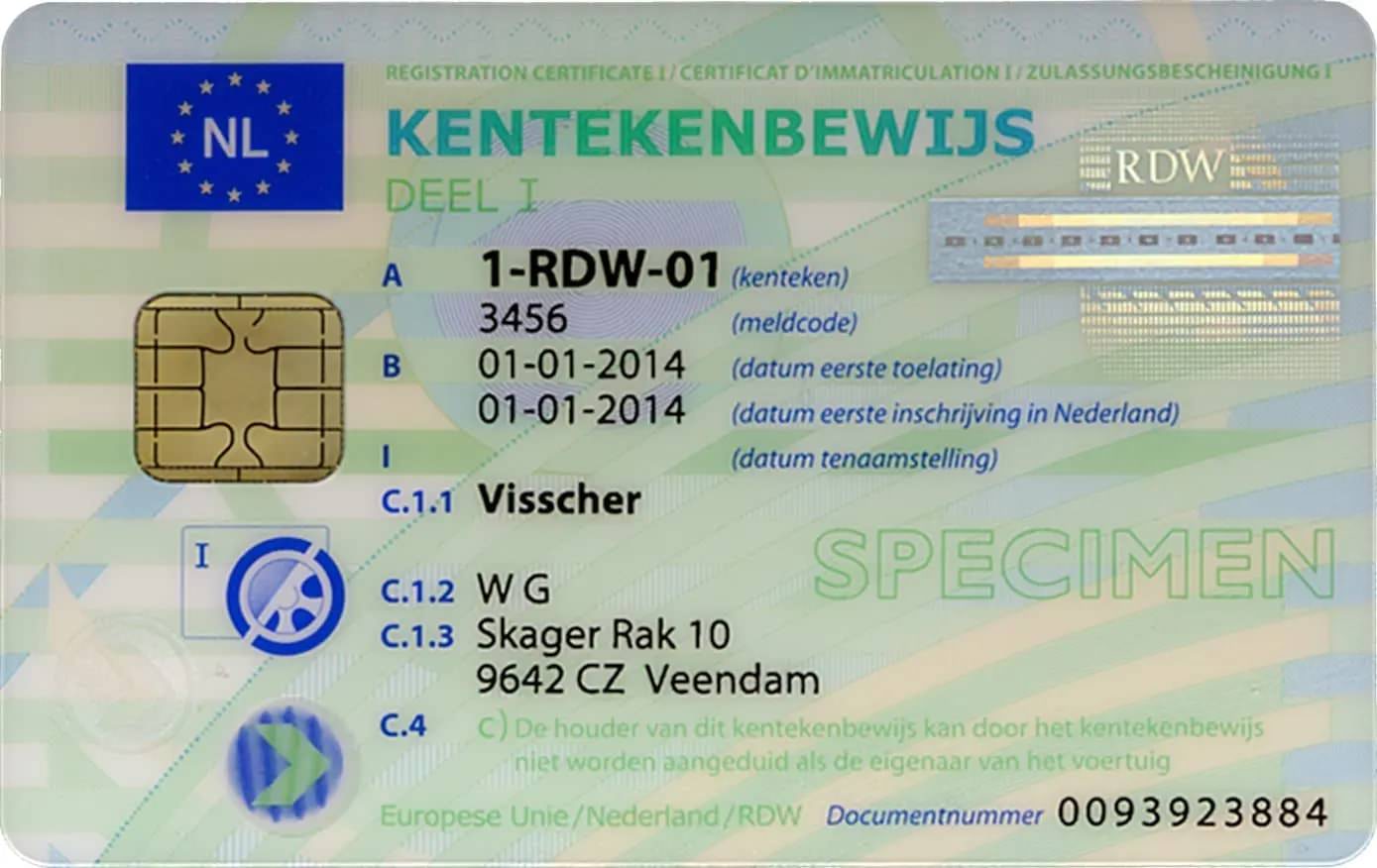
Example of a vehicle registration card
8. Obtain Dutch insurance
At this point, Dutch law mandates at least third-party liability insurance for all vehicles. Compare insurance rates and keep in mind that some insurers specialize in coverage for car traders, which might offer more favorable terms for your business.
9. Make Dutch license plates
Once the registration is complete, you'll need to make license plates with an official license plate manufacturer.
To find your closest official plate manufacturer, type your postcode into the RDW search bar and choose “Kentekenplaten laten maken”.
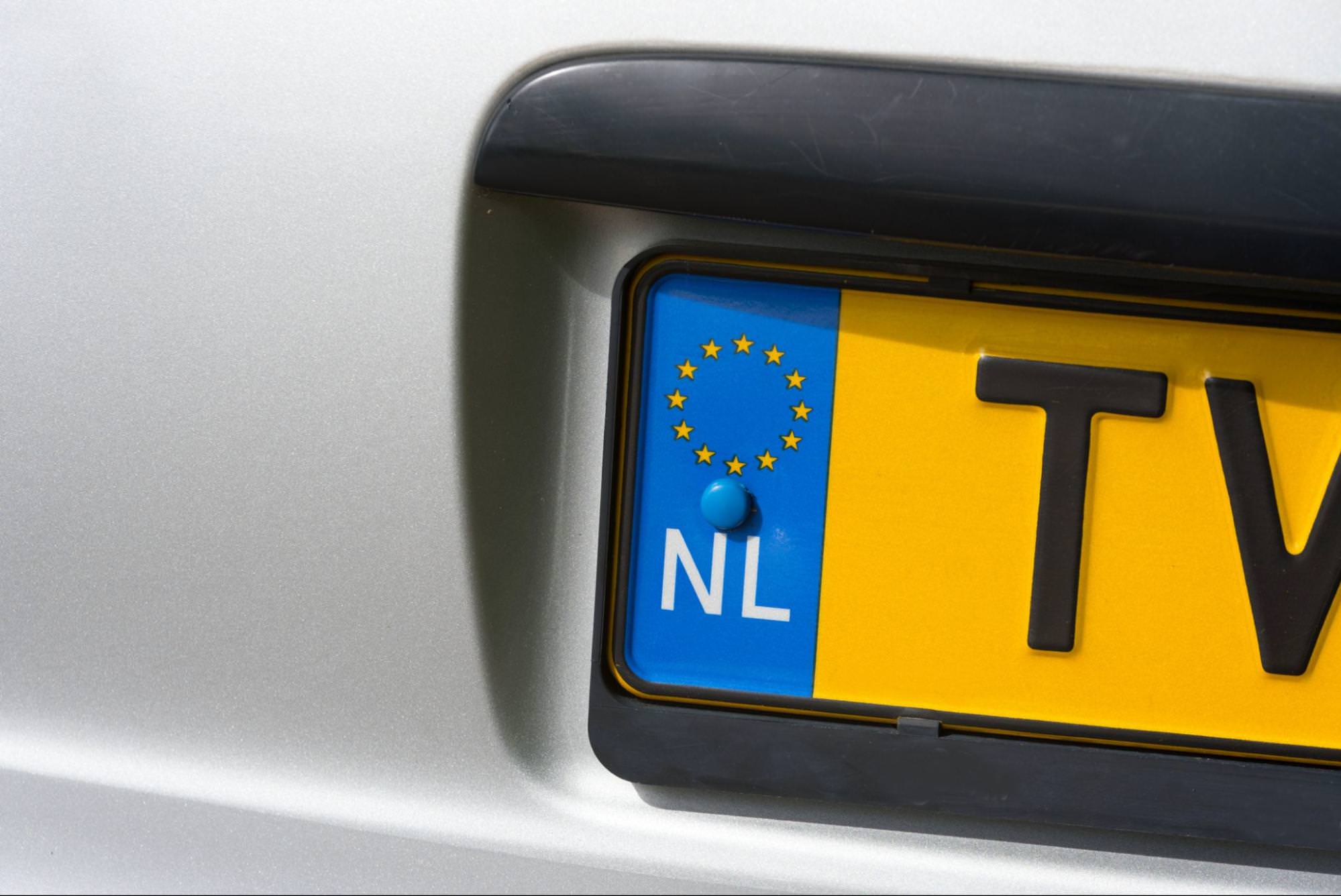
Importing a Car to the Netherlands - FAQ
Here's a collection of frequently asked questions to help you navigate common issues:
► Can I import any car to the Netherlands?
Not necessarily. While you can import most cars, they must comply with Dutch and EU regulations. Vehicles that don't meet emission standards or lack essential safety features may be challenging or impossible to import. Always check the latest requirements before purchasing a vehicle for import.
► How to navigate BPM? Why is it so high for some cars?
BPM is a tax based on a vehicle's CO2 emissions and value. It's designed to encourage the use of more environmentally friendly vehicles. Larger, more powerful cars with higher emissions often incur a higher BPM. The Dutch government regularly adjusts BPM rates, so it's crucial to use the most current calculator for accurate estimates.
► Are there any advantages to importing electric or hybrid vehicles?
Yes, there can be significant advantages. Electric and low-emission hybrid vehicles often benefit from lower BPM rates and may be eligible for additional incentives. They're also increasingly popular in the Dutch market, potentially offering better resale value.
► Is it worth using a customs broker or import specialist?
For new traders or complex cases, using a customs broker or import specialist can be highly beneficial. They can help navigate the paperwork, ensure compliance with all regulations, and potentially save you time and money in the long run. As you gain experience, you may choose to handle more of the process yourself.

All you need to know about car import to the Netherlands
Importing cars to the Netherlands offers great potential for car traders, but it requires knowledge about the complexities of the import process.
You’ll have to understand the market, navigate regulations, and manage documentation and taxes efficiently so you can build a profitable car import business in the Dutch market.
Importing vehicles from Europe can be complex, but eCarsTrade is here to simplify the process. Learn how to:

